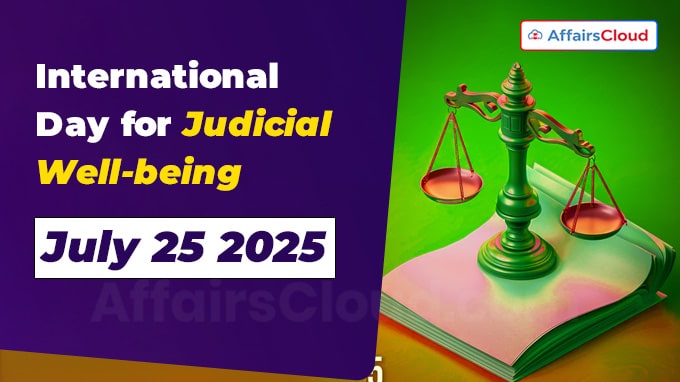 The first ever United Nations (UN’s) International Day for Judicial Well-being was observed on 25th July 2025, to ensure the importance of psychological well-being of judges and magistrates, who uphold the rule of law in the world.
The first ever United Nations (UN’s) International Day for Judicial Well-being was observed on 25th July 2025, to ensure the importance of psychological well-being of judges and magistrates, who uphold the rule of law in the world.
- The day is dedicated to increasing awareness about the mental, emotional, and physical health issues judges experience, recognizing their strong connection to judicial integrity and the proper functioning of justice.
- The day commemorates the adoption of the Nauru Declaration on Judicial Well‑being at the Regional Judicial Conference in Nauru on July 25, 2024.
About International Day for Judicial Well-being:
Background: In 4 March 2025, the United Nations General Assembly (UNGA) adopted Resolution A/RES/79/266 during its 58th plenary meeting and proclaimed 25th July of every year to be International Day for Judicial Well-being.
- The Resolution was initiated by Justice Rangajeeva Wimalasena, President of the Court of Appeal of Nauru and First Secretary Ms. Josie Anne Jacob in coordination with the UN Office on Drugs and Crime (UNODC).
- The resolution was voted unanimously by over 160 countries, 1 not in favor (United States) and 3 abstentions (Haiti, Madagascar, Syria). It includes 70 co-sponsoring Countries including India, United Kingdom(UK), Australia, France, Japan, Nigeria, and Sri Lanka.
Observance: The resolution invites UN Member States, UN agencies, regional and international organizations, judicial institutions, academia, bar associations, and civil society to mark the day for the well-being of judges and magistrates.
2025 Events: To mark the day, various bar associations, judicial councils, and academic institutions held special webinars and events featuring well-known members of the judiciary.
- Notably, the Federal Bar Association (FEDBAR) and the International Bar Association (IBA) hosted webinars with prominent judges and legal experts.
About Nauru Declaration:
Adoption: The Nauru Declaration on Judicial Well-being was adopted on 25 July 2024 during the Regional Judicial Conference in Nauru.
- It is the first international declaration to formally recognize judicial well-being as essential to the independence, integrity, and effectiveness of the judiciary.
Guiding Principles: It outlines seven core principles to guide judicial systems globally.
UNODC Global Judicial Integrity Network Survey (2021–22):
Survey Overview: A global survey conducted in 2021–22 by the UNODC Global Judicial Integrity Network highlighted significant concerns regarding judicial well-being.
Mental Health : 69% of judges reported that discussing stress or mental health remained a taboo within the judiciary.
Support: 83% felt that existing support systems within their institutions were inadequate.
Emotional Strain: 89% stated they personally knew fellow judges who had experienced stress, sadness, or anxiety.
About United Nations General Assembly (UNGA):
President- Philémon Yang
Headquarters- New York, United States of America (USA)
Established- 1945




